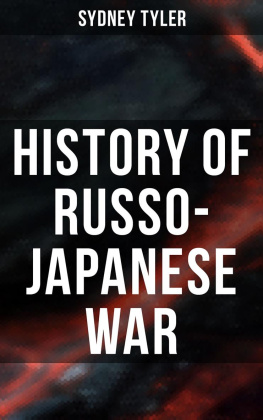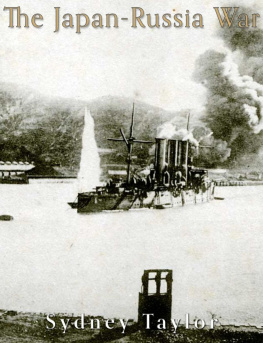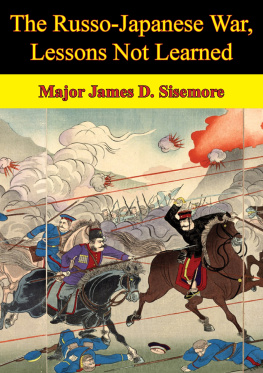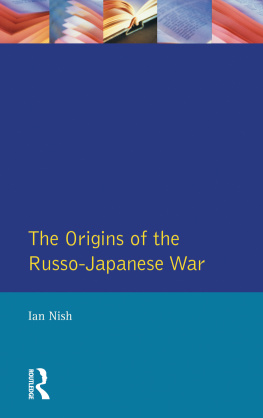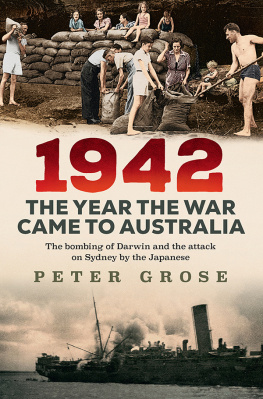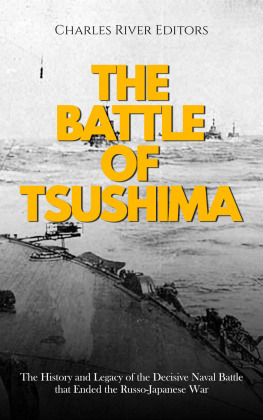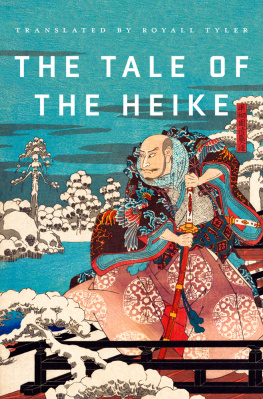INTRODUCTION
The Japan-Russia War goes into history as the greatest military struggle the world has known. Its story, therefore, rivals in interest those of the great wars of the past which have been an unceasing inspiration in every field of art and literature. The political machinations of great and little kings, of famed prime ministers, of peoples and states have attracted attention in more or less limited circles, but the world's wars have appealed to every class and rank. The world's vast army of readers have never wearied of the classic stories of feats of arms by men and armies told of the dawning days of world history; the tales of later map-making struggles of Asia, of Europe, of America, have never grown old or dull. So in the Orient of to-day. The great political battles which have centred about China and Japan for the last half century have interested the few. But to-day the attention of the world is centred on the lands bordering the Pacific, because a war has waged; because the whole human family loves the stories of valorous deeds, of military achievement, of the history-making that is done with the sword.
The purpose of this volume is to bring American readers face to face with the events of the struggle of such stupendous magnitude, now drawn to a close. From battlefield to battlefield the author carries his thrilling narrative, bringing the scenes before the mind's eye as only one could do who stood within sound of the roaring guns, within sight of the onrush of resistless battalions, elbow to elbow with Japan's brilliant history makers. From the opening of the struggle to its close there was never a moment when stupendous events were not either in the process of making or so imminent that the civilized world held its breath. A single year's campaign in Manchuria and around famed Port Arthur furnish three land battles, greater in the number engaged in the awful cost of life, in the period of duration, than is presented by all of the pages of history. The siege of Port Arthur has no duplicate among all recorded military achievements. The opening of the second year of the war added a battle, that at Mukden, so vast, so brilliant from the standpoint of the victors, so disastrous from the standpoint of the defeated, that it has been accorded by masters of strategy a niche by itself in the chronicles of war. The author saw this wonderful panorama of events unfolded. His story bristles with dramatic touches, flashes of enlightening description that bring the scene home to the reader with a vividness that thrills.
American readers have a more immediate interest in the struggle than the universal love of the stories of battle. With Japan victor over Russia, with the great Muscovite Empire deprived of a foothold on the Pacific, Japan and America remain the only Powers there to divide the rich spoils of Oriental commerce. Our possessions, the Philippines, are Japan's nearest neighbors, and their proximity to Japan, their bearing upon the Asiatic problem open the way for events of more than ordinary importance, if not of seriousness. Already the statement has been made that Japan covets these Islands. Will the United States, one day be called upon to go to war in their behalf? The question is one which no American can ignore. The nation must educate itself to decide one day, the issue, for or against a struggle with this wonderful little Empire, the Great Britain of Asia. The volume, therefore, in addition to its value and interest as a chronicle of a marvelous series of bloody battles is educational, the pioneer, blazing the way to an appreciation of events, of possibilities for our own country which lie in the story of Japan's overwhelming success. Will the Mikado come to believe that having humbled and crushed what was Europe's mightiest Power, he can as readily drive from the Pacific the American Republic?
The author in this volume has even more completely demonstrated his genius as a chronicler of war than in any of his earlier efforts. Step by step he followed the British in Africa and at the conclusion of that struggle contributed to British literature a history which was generally conceded to have been more accurate, more graphic, less warped by prejudices than any other. Step by step he followed the unfolding of our own Spanish war and the story of that struggle as told by Mr. Tyler became at once the standard not only in Great Britain, but in the several Continental countries in which it appeared. With the priceless experience of these two wars to ably equip him, Mr. Tyler has contributed one more narrative of a great war to military literature and the assertion is unhesitatingly made that it will not be equalled by any of the hosts of volumes destined to be written of this memorable war.
Along with the author went his camera. To that fact the reader is indebted to a series of illustrations never before attempted in the portrayal of military campaigns. What little the author has left to the imagination is supplied by these graphic pictures that bridge nine thousand miles and bring the sights and almost the sounds of battle to the reader.
In brief, this volume as a description of the succeeding struggles of the Japan-Russia War, for accuracy, graphic qualities, detail and literary finish; for its educational value and significance, for the hitherto unattempted excellence of its illustration is presented to the American public with confidence that an appreciative reception will not possibly be denied.
THE PUBLISHERS.
CHAPTER I.
Never since the great Napoleonic wars which convulsed Europe a century ago has the world witnessed an appeal to arms so momentous in its issues and so tremendous in its possibilities as that which has just been tried between Russia and Japan in the Far East. The great internecine struggle in the United States in the middle of the last century, the disastrous duel between France and Germany which followed, and England's recently-concluded campaign in South Africa, have each, indeed, left a deep mark upon history. But while their import was at most Continental, if not local, the conflict between Japan and Russia is fraught with consequences which must inevitably be world-wide in scope. There is no civilized Power in either hemisphere whose interests are not more or less directly concerned in the questionWho shall be the dominant Power in the China Seas? For the whole course of the world's development in that quarter must depend on whether the mastery remains to the obstructive and oppressive Colossus of the North or to the progressive and enlightened island-Empire which, like Pallas in Pagan myth, has sprung fully armed from an ancient civilization into the very van of modern progress. It was no mere dynastic jealousy or racial animosity that brought about this fateful collision. It was the inevitable antagonism of two irreconcilable destinies. "Two stars keep not their motion in one sphere"; and the ambitions of Russia and the aspirations of Japan cannot find room for fulfilment together. One or the other must be crushed.
For Japan, the question is one of national existence. With Russia established in Manchuria and dominating the Yellow Sea, the absorption of Korea becomes a mere matter of time; and then the very independence of Japan would be subject to a perpetual and intolerable menace; while the new life which has dawned for its wonderfully gifted people would be crushed at the outset. But if Japan is fighting for her life, Russia is fighting for something almost as preciousthe consummation of an ambition which has been the dream and the fixed goal of her statesmen for more than a generation. The expansion of the Russian Empire has been steadily eastwards; and the further conquest and dominion have spread, the more has the necessity been felt for an outlet to the navigable seas. Unless all the labor and sacrifices of years are to be in vain, and the great Siberian Empire is to remain a mere gigantic


